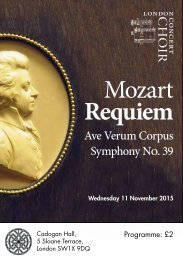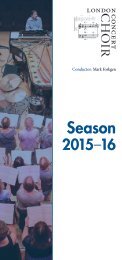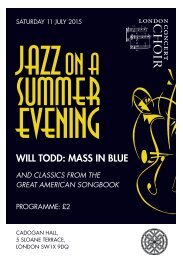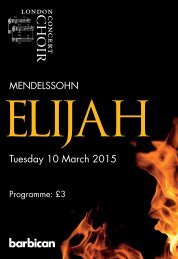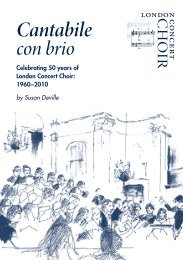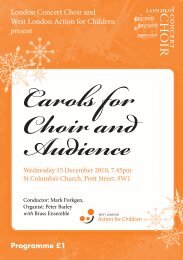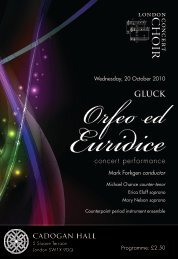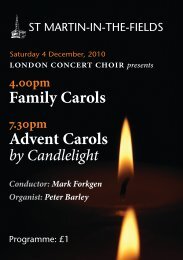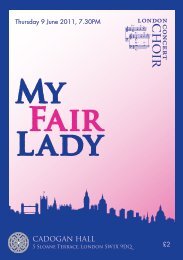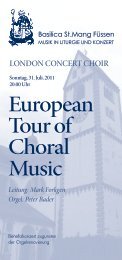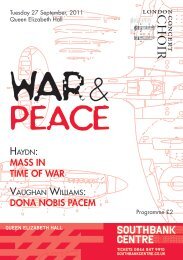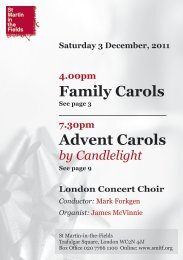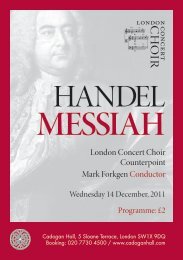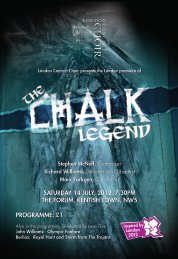10 July 2014: The Seasons (Haydn)
Create successful ePaper yourself
Turn your PDF publications into a flip-book with our unique Google optimized e-Paper software.
<strong>Haydn</strong>: <strong>The</strong> <strong>Seasons</strong><br />
Thursday <strong>10</strong> <strong>July</strong> <strong>2014</strong><br />
Programme £2<br />
Cadogan Hall,<br />
5 Sloane Terrace,<br />
London SW1X 9DQ
WELCOME TO CADOGAN HALL<br />
In the interests of your comfort and safety, please note the following:<br />
• Latecomers will only be admitted to the auditorium during a suitable<br />
pause in the performance.<br />
• Cadogan Hall is a totally non-smoking building.<br />
• Glasses, bottles and food are not allowed in the auditorium.<br />
• Photography, and the use of any video or audio recording equipment,<br />
is forbidden.<br />
• Mobiles, Pagers & Watches: please ensure that you switch off your<br />
mobile phone and pager, and deactivate any digital alarm on your<br />
watch before the performance begins.<br />
• First Aid: Please ask a Steward if you require assistance.<br />
Thank you for your co-operation. We hope you enjoy the performance.<br />
<strong>The</strong> <strong>Seasons</strong><br />
Words by Gottfried Van Swieten.<br />
Music by Franz Joseph <strong>Haydn</strong><br />
English Translation by Michael Pilkington<br />
© Copyright Novello & Company Limited.<br />
All Rights Reserved. International Copyright Secured.<br />
Used by permission of Novello & Company Limited.<br />
Programme note © Richard Wigmore<br />
Programme designed by Stephen Rickett and edited by Eleanor Cowie<br />
London Concert Choir - A company limited by guarantee, incorporated in England<br />
with registered number 3220578 and registered charity number <strong>10</strong>57242<br />
Registered Office 7 Ildersly Grove, Dulwich, London SE21 8EU
Thursday <strong>10</strong> <strong>July</strong> <strong>2014</strong><br />
Cadogan Hall<br />
<strong>Haydn</strong>: <strong>The</strong> <strong>Seasons</strong><br />
Conductor: Mark Forkgen<br />
Rachel Elliott soprano<br />
Nicholas Hurndall Smith tenor<br />
Toby Stafford-Allen bass<br />
London Concert Choir<br />
Southbank Sinfonia<br />
<strong>The</strong>re will be an INTERVAL of 20 minutes after Part Two
Franz Joseph <strong>Haydn</strong> (1732-1809)<br />
<strong>The</strong> <strong>Seasons</strong> (Hob. 21:3)<br />
Oratorio in four parts for soloists,<br />
chorus and orchestra<br />
After the phenomenal success of <strong>The</strong> Creation, premiered<br />
in Vienna in the spring of 1798, the librettist, Baron Gottfried van Swieten,<br />
lost no time in proposing another oratorio text to <strong>Haydn</strong>, again with a British<br />
source: his own drastically abridged adaptation of James Thomson’s pastoral<br />
epic <strong>The</strong> <strong>Seasons</strong>, which, since its publication in 1730, had rapidly become one<br />
of the most popular of all 18th-century poems. Jettisoning most of Thomson’s<br />
abstract moralising, van Swieten shifted the scene to <strong>Haydn</strong>’s native Burgenland<br />
and in a spirit of unsullied Enlightenment optimism omitted tragic details such<br />
as the wanderer frozen to death in a snowstorm.<br />
<strong>The</strong> lordly, self-opinionated Baron was certainly no poet. Time and again he<br />
dulled and flattened Thomson’s brilliant and original imagery, compounding<br />
the problem further with the English ‘back-translation’ of his German text (to<br />
maximise sales <strong>The</strong> <strong>Seasons</strong> was actually issued in German, English and French<br />
– the first-ever trilingual publication!). But, working closely with the composer,<br />
he was often shrewd in his choice of which details to omit and which to include.<br />
In many ways the finished libretto was right up <strong>Haydn</strong>’s street: akin to <strong>The</strong><br />
Creation in its celebration of an idyllic, divinely ordered world, yet embracing<br />
an even wider range.<br />
<strong>Haydn</strong>, though, worked on <strong>The</strong> <strong>Seasons</strong> with increasing reluctance, protesting<br />
that he was too weary and that the libretto was banal and prosaic by comparison<br />
with <strong>The</strong> Creation. Although the Baron bullied and cajoled him into finishing<br />
the oratorio, it has suffered from just about the worst press any composer has<br />
given his own music.<br />
<strong>Haydn</strong> repeatedly grumbled that he’d rather be at work on the more exalted<br />
subject of <strong>The</strong> Last Judgement (a project that, tantalisingly, he was never to<br />
realise). Still smarting at superior critics’ attacks on <strong>The</strong> Creation’s animal<br />
imitations, he derided the croaking frogs and chirping crickets in ‘Summer’,<br />
so delightful to us, as französicher Quark (‘Frenchified trash’) – ie, the kind
of tone-painting found in the opéras comiques of Auber and other French<br />
composers. When he came to set the words ‘O toil, O noble toil’ in ‘Autumn’,<br />
he muttered that while he had been an industrious man all his life, he would<br />
never have dreamt of setting ‘industry’ to music; and he summed up the<br />
relative merits of the two oratorios by remarking mordantly that while the<br />
solo voices in <strong>The</strong> Creation were those of angels, in <strong>The</strong> <strong>Seasons</strong> ‘only [the<br />
peasant] Simon speaks’. Yet for all <strong>Haydn</strong>’s strictures, van Swieten’s text gave<br />
him plenty to fire his imagination; and he responded with music of unquenchable<br />
vitality and freshness of observation.<br />
First heard in the Palais Schwarzenberg in Vienna on 24 April 1801 “with the<br />
same unanimous approval as <strong>The</strong> Creation” (<strong>Haydn</strong>’s words), <strong>The</strong> <strong>Seasons</strong> is a<br />
joyous evocation of the world in which the composer, a master-wheelwright’s<br />
son, had grown up.<br />
Though God is invoked directly in the fugal choruses that close ‘Spring’ and<br />
‘Winter’, <strong>The</strong> <strong>Seasons</strong> is the least solemn, most hedonistic of oratorios. Essentially<br />
a series of lovingly painted frescoes, it epitomises <strong>Haydn</strong>’s final creative period in<br />
its juxtaposition and fusion of the popular and the sublime, pastoral innocence<br />
and the most sophisticated orchestral and harmonic language. Indeed, like Die<br />
Zauberflöte, Mozart’s great celebration of Enlightenment values, <strong>The</strong> <strong>Seasons</strong><br />
effortlessly incorporates a diverse array of styles, from Viennese Singspiel<br />
[music drama] to the exhilarating fugal choruses that reflect <strong>Haydn</strong>’s encounter<br />
with Handel’s music in London.<br />
Spring<br />
Each of the four cantatas that make up <strong>The</strong> <strong>Seasons</strong> opens with an orchestral<br />
tone-poem. <strong>The</strong> splendid G minor introduction “depicts the passage from<br />
winter to spring”: the former evoked in blustery, densely contrapuntal music,<br />
trombones to the fore; the latter in airy exchanges between violins and wind. In<br />
the recapitulation <strong>Haydn</strong> omits this ‘Spring’ music and sweeps directly into the<br />
recitative for the peasants: Simon (bass), Lucas (tenor) and Simon’s daughter<br />
Jane (soprano). Tonal resolution comes with the gracefully lilting G major<br />
chorus, ‘Come, gentle Spring’, with its musette drones, and its opposition of<br />
women’s and men’s voices – a technique <strong>Haydn</strong> used in several other choruses.
RECITATIVE<br />
Simon<br />
Behold how surly Winter flies;<br />
to polar regions now he goes.<br />
Now follows at his call<br />
the savage storm’s tumultuous host<br />
with all its dreadful roar.<br />
Lucas<br />
And see, from craggy rocks the snow<br />
in muddy streams flows down the slopes!<br />
Jane<br />
And see how from the South,<br />
by mild and gentle winds allur’d,<br />
the Spring again appears.<br />
CHORUS OF COUNTRY FOLK<br />
Come, gentle Spring!<br />
<strong>The</strong> gift of heaven, come!<br />
From deathly winter sleep<br />
bid Nature now awake!<br />
And now she nears, the gentle Spring,<br />
her soft and balmy breath we feel,<br />
and soon will life to all return.<br />
But yet do not too soon rejoice,<br />
for oft, enwrapp’d in mist and fog,<br />
the Winter will return and spread<br />
o’er bud and flow’r his chilling frost.<br />
Come, gentle Spring!<br />
<strong>The</strong> gift of heaven, come!<br />
Upon our meadows now descend!<br />
O come, gentle Spring O come,<br />
return, delay no more!<br />
In the jaunty ploughman’s song that follows, <strong>Haydn</strong> resisted van Swieten’s<br />
attempts to get him to include a tune from a popular German opera and<br />
instead had Simon whistle the famous melody from his ‘Surprise’ Symphony.<br />
<strong>The</strong> upshot was one of the oratorio’s instant hits, spiced by delicious scoring<br />
for piccolo (the only time <strong>Haydn</strong> ever used the instrument), oboes,<br />
bassoons and horns.<br />
RECITATIVE - Simon<br />
From Aries now the sun<br />
shines brightly down upon us here.<br />
Now frost and fog retire,<br />
and mild mists hover all about;<br />
our mother earth is now revived,<br />
enliven’d is the air.<br />
ARIA - Simon<br />
With joy th’impatient husbandman<br />
sets forth to till the field,<br />
the furrow’s length he strides along<br />
and whistles as he ploughs.<br />
And then with slow and measur’d step<br />
he casts the seed abroad,<br />
by faithful earth preserv’d it soon<br />
will grow to golden com.<br />
RECITATIVE - Lucas<br />
<strong>The</strong> farmer now his work hath done,<br />
avoiding neither pain nor toil;<br />
the hand of nature will in time<br />
provide reward;<br />
for this he pleads<br />
and so he prays to heaven above.<br />
Two extended solo-choral complexes make up the second half of ‘Spring’. <strong>The</strong><br />
Prayer ‘Now be gracious, bounteous Heav’n’ begins with a serene, hymnic<br />
melody, akin to those in the Adagio of Symphony No. 98 and the ‘Agnus Dei’
settings of the late Masses, and ends with a fervent fugue that virtually<br />
quotes the ‘Quam olim Abrahae’ section from Mozart’s Requiem – the first of<br />
several, surely conscious, Mozartian reminiscences in <strong>The</strong> <strong>Seasons</strong>.<br />
<strong>The</strong> popular and the sublime are directly juxtaposed in the last number of ‘Spring’.<br />
This opens in A major with a ‘Song of Joy’ in quasi-folk vein, enlivened by charming<br />
illustrative touches. After working its way to D major, the music seems to peter<br />
out. <strong>The</strong>n, following a pause, <strong>Haydn</strong> introduces a series of massive fanfares in<br />
the remote key of B flat. After a lyrical solo trio, dramatically interrupted by<br />
more choral cries, ‘Spring’ closes with a majestic, intricately worked fugue that,<br />
as so often in <strong>Haydn</strong>’s fugal choruses, becomes more symphonic and less strictly<br />
contrapuntal as it proceeds.<br />
PRAYER - Trio and Chorus<br />
Now be gracious, bounteous Heaven,<br />
open wide, and pour thy blessings<br />
over all our lands below.<br />
Let earth receive the dew’s refreshment.<br />
Let rainfall now enrich the furrows.<br />
And let thy breezes gently blow,<br />
thy sun send forth his shining rays!<br />
To us abundant life will flow,<br />
and we will give thee thanks and praise.<br />
RECITATIVE - Jane<br />
Our fervent prayers are heard;<br />
the warm west wind arises and fills<br />
the sky above with sailing clouds.<br />
<strong>The</strong> clouds increase; they now descend,<br />
and pour into the lap of earth<br />
the pride and wealth of Nature’s store.<br />
SONG OF JOY<br />
Jane, Lucas and Chorus of Young People<br />
O how lovely is the landscape<br />
spread before our eyes!<br />
Come, dear maidens, let us wander<br />
o’er the verdant fields!<br />
O how lovely is the landscape<br />
spread before our eyesl<br />
Come, young fellows, let us wander<br />
through the fresh green woods!<br />
See the lilies, see the roses,<br />
all the flow’rs in bloom!<br />
See the pastures, see the meadows,<br />
see the open fields.<br />
See the mountains, see the rivers,<br />
see the sparkling airl<br />
All is living, all is floating,<br />
ev’ry creature now astir.<br />
See the lambs, how they are leaping!<br />
See the shoals of fishes swimming!<br />
See how all the bees are swarming!<br />
See the birds now all aflutter!<br />
O what pleasure, what enjoyment<br />
swells within our hearts!<br />
Sweetest fancies, gentle charms<br />
bring gladness to our souls.<br />
That which touches and delights you<br />
is the presence of the breath of God.<br />
Let us honour, let us worship,<br />
let us give our praise to him!<br />
In resounding song to thank him<br />
raise your voices high!<br />
Trio and Chorus<br />
Wonderful, powerful, merciful God!<br />
From thy most blessed table<br />
dost thou provide our food,<br />
From streams of joy unending<br />
thou givest us to drink.<br />
Glory, laud and praise be thine,<br />
wonderful, merciful God.
Summer<br />
‘Summer’ falls into two large, virtually continuous sections. <strong>The</strong> first moves<br />
from the atmospheric orchestral portrayal of the dawn (<strong>Haydn</strong> originally scored<br />
this for divided violas, cellos and basses, eventually adding violins for safety<br />
reasons), via the oboe-as-cockerel and a bucolic aria with horn obbligato for<br />
Simon (a foretaste here of Beethoven’s ‘Pastoral’ Symphony), to an exhilarating<br />
chorus in praise of the sun. This opens with a sunrise, as overwhelming in its<br />
way as the very different sunrise in <strong>The</strong> Creation, and closes, after another lyrical<br />
interlude for the solo trio, in a riot of fugal laughter.<br />
RECITATIVE<br />
Lucas<br />
In misty mantle now draws near<br />
the gentle morning light;<br />
with limping step at her approach<br />
the weary night retires.<br />
To dark and gloomy caves the birds<br />
of doom now take their flight,<br />
and with their mournful cries<br />
appal the timid heart no more.<br />
Simon<br />
<strong>The</strong> herald of the new-born day,<br />
with sharp and penetrating voice,<br />
to new activity now calls<br />
the shepherd from his rest.<br />
ARIA - Simon<br />
So now the cheerful shepherd goes<br />
to gather all his bleating flock;<br />
to pastures rich he drives them out,<br />
slowly o’er the verdant hills.<br />
Towards the East he gazes then,<br />
while leaning on his shepherd’s crook,<br />
and waits to see the rising sun<br />
shed abroad his glorious light.<br />
RECITATIVE - Jane<br />
<strong>The</strong> rosy dawn breaks forth in light;<br />
like wisps of smoke the clouds disappear;<br />
the heav’n is clothed resplendent in blue,<br />
the mountain peaks in fiery gold.<br />
TRIO AND CHORUS<br />
And now ascends the sun, he climbs,<br />
he nears, he comes,<br />
he beams, he shines.<br />
Now shine with glorious pow’r<br />
the fires of his majesty.<br />
Hail, O sun, all hail!<br />
<strong>The</strong> source of light and life, all hail!<br />
Thou soul and eye of all the worlds,<br />
thou God-like shining star.<br />
We give thee grateful thanks,<br />
thou God-like shining star.<br />
For who can tell the jubilation<br />
thy gracious presence stirs in us?<br />
Who numbers them, the many blessings<br />
that of thy kindness we receive?<br />
<strong>The</strong> jubilation, who can tell?<br />
Thy blessings, O who numbers them? Who?<br />
All thanks to thee for giving joy.<br />
All thanks to thee for giving life.<br />
All thanks to thee for giving health.<br />
But more to God who gave to thee<br />
the pow’r thy beams display.<br />
Hail, O sun, all hail!<br />
the source of light and life, all hail!<br />
Now praises come from all men,<br />
these praises nature joins.
<strong>The</strong> scene darkens in a baleful recitative, punctuated by distant thunder. <strong>The</strong>n,<br />
with forked lightning on the flute, the tempest erupts. In this, the first great<br />
Romantic picture-in-sound of the warring elements, <strong>Haydn</strong> creates a musical<br />
counterpart to the cataclysmic storms that Turner would depict a quarter of<br />
a century later. After a fugue on a drooping chromatic subject – traditional<br />
symbol of lamentation and death – the tempest recedes amid desultory lightning<br />
flashes; and normal rustic life resumes in the final trio and chorus, opening<br />
with <strong>Haydn</strong>’s ‘Frenchified trash’ (bellowing cattle, croaking frogs and the like)<br />
and closing with an enchanting chorus of villagers that transmutes the storm’s<br />
tremolandos into drowsy murmurs.<br />
RECITATIVE<br />
Simon<br />
O see! <strong>The</strong>re rises in the sultry air,<br />
close by the border of the hills,<br />
a pallid fog of mist and vapour form’d.<br />
‘Tis small at first, but now expands,<br />
and soon black darkness covers<br />
all beneath the gloomy sky.<br />
Lucas<br />
Hear, from the vale, how the dull roar<br />
announces storm to come!<br />
See how the baleful cloud<br />
with slow progression makes its way<br />
and threatens all the land below!<br />
Jane<br />
In dread foreboding<br />
all living Nature waits.<br />
No beast, no leaf dares stir itself.<br />
A deathly hush is all around.<br />
CHORUS<br />
Ah, the thunderstorm comes near!<br />
Help us, heaven!<br />
O how the thunder rolls!<br />
Now rage the winds about us!<br />
Where shall we fly?<br />
Flashes of lightning now streak through the air,<br />
the bolts from the sky now burst the clouds open,<br />
to pour down torrents of rain.<br />
Where is safety? Heaven help us!<br />
Dreadful roars the storm.<br />
<strong>The</strong> open sky is aflame.<br />
Save us wretches!<br />
Crashing, smashing, crack on crack<br />
the thunder rolls with awful noise.<br />
Save us! Save us!<br />
<strong>The</strong> whole world shakes and trembles<br />
e’en to the ocean floor.<br />
TRIO AND CHORUS<br />
And now the storm has passed away;<br />
the clouds disperse, the winds die down.<br />
Before the time to set has come<br />
the sun looks out once more,<br />
and so his final sparkling rays<br />
with pearls adorn the fields.<br />
Now to its well-accustom’d home,<br />
enliven’d and refreshed,<br />
the well-fed herd returns.<br />
<strong>The</strong> quail already calls his mate.<br />
<strong>The</strong> cricket chirps from out the grass.<br />
<strong>The</strong> frog is croaking in the marsh;<br />
the distant curfew now tolls.<br />
<strong>The</strong> evening star shines from above,<br />
inviting us to soft repose.<br />
Maidens, young men, women, come!<br />
Soothing sleep awaits us now,<br />
for this is granted honest hearts<br />
and healthy bodies after toil.<br />
We come. We follow you.<br />
<strong>The</strong> distant curfew now has tolled.<br />
<strong>The</strong> evening star shines from above, etc.
Autumn<br />
Following the minuet-like introduction, indicating ‘the husbandman’s<br />
satisfaction at the abundant harvest’, the trio and chorus in praise of industry<br />
is <strong>Haydn</strong>’s supreme triumph over an originally prosaic text: a noble, powerfully<br />
organised movement initiated by Simon alone, with chuckling woodwind<br />
commentaries, and culminating in a choral fugue that climaxes in a stunning<br />
harmonic ‘purple patch’.<br />
RECITATIVE<br />
Jane<br />
What with all its blossoms<br />
was promis’d by the Spring,<br />
what the warmth of Summer<br />
to welcome ripeness brought,<br />
Autumn with its fullness<br />
shows to the farmer now.<br />
Lucas<br />
For there on heavy loaded carts<br />
th’abundant harvest home is borne.<br />
<strong>The</strong> plenty that the fields provide<br />
his massive barns can scarce contain.<br />
Simon<br />
With cheerful eye he looks around,<br />
and measures all the bounteous<br />
produce there,<br />
and pleasure floods into his heart.<br />
TRIO WITH CHORUS<br />
So Nature thus rewards his toil;<br />
she calls, she smiles at him,<br />
encouraging his hopefulness,<br />
she willing gives her aid;<br />
she works for him with pow’r and strength.<br />
From thee, O toil, comes ev’ry good.<br />
<strong>The</strong> cottage, where we dwell,<br />
the clothing that we wear,<br />
our daily bread to eat,<br />
are blessings all by thee bestow’d.<br />
O toil, O noble toil,<br />
from thee comes ev’ry good.<br />
In thee all virtues grow,<br />
and manners rude are overcome.<br />
By thee the heart of man<br />
is cleans’d and purified.<br />
From thee all courage comes,<br />
that duty and good may fill our daily life.<br />
<strong>The</strong> hunting scenes that follow are portrayed with relish by <strong>Haydn</strong>, who had been<br />
an enthusiastic huntsman in his younger days. After the bird shoot, recounted in<br />
a Baroque-style bass aria with burbling bassoon obbligato, and the hare-coursing,<br />
comes the most spectacular of all hunting choruses, based on traditional hunting<br />
calls and tracing an audacious tonal journey from D major to E flat.<br />
RECITATIVE - Simon<br />
Now on the bare denuded fields<br />
some uninvited guests appear,<br />
that on the stalks found nourishment,<br />
and wander seeking further food.<br />
<strong>The</strong>se little thefts do nought to harm<br />
the farmer, he can leave them be,<br />
unless excessive losses come<br />
that he can ill afford.
<strong>The</strong>n action that can this prevent<br />
he sees as benefit,<br />
and willing enters on the hunt<br />
that gives his master such delight.<br />
ARIA - Simon<br />
Look there upon the open field!<br />
<strong>The</strong> hound is moving through the grass.<br />
He searches there to find the scent<br />
and then will tireless follow it.<br />
But over eager now he runs,<br />
he heeds his master’s orders no more:<br />
he hastens on forward then sudden stops<br />
and stands unmoving as a stone.<br />
<strong>The</strong> startl’d bird now takes to flight<br />
in hope the danger to avoid:<br />
but all his speed will not avail.<br />
<strong>The</strong> gun is fired, he is struck by the shot<br />
that drops him dead from the sky to earth.<br />
RECITATIVE - Lucas<br />
<strong>The</strong> hares from out their beds<br />
are driven by the closing ring.<br />
Now press’d about on evr’y side<br />
they find there’s no escape,<br />
and soon they fall, to be laid out<br />
as trophies of the hunter’s sport.<br />
CHORUS OF PEASANTS AND HUNTERS<br />
Hark, hark, a sonorous sound<br />
is through the forest ringing!<br />
What a clamorous din<br />
is heard throughout the wood!<br />
It is the horn with its thrilling call,<br />
the ravenous hounds are now baying.<br />
<strong>The</strong> stag already is arous’d,<br />
pursuing are hunters and eager dogs.<br />
He flies, he flies. O see how he bounds!<br />
pursuing are hunters and eager dogs.<br />
See how he leaps! See how he bounds!<br />
<strong>The</strong>n from the coppice he breaks for the fields,<br />
and hastens across to the thickets beyond.<br />
He now has bewilder’d the hounds,<br />
at fault they range and go astray.<br />
<strong>The</strong> hounds are now at fault,<br />
they wander here and there.<br />
<strong>The</strong> huntsman calls, and blows his horn<br />
to gather them once again.<br />
Ho, ho, ho, tallyho!<br />
With redoubled ardour now the pack<br />
recovers the scent of the fleeing prey.<br />
Thus overtaken by his foes,<br />
his courage and his vigour lost,<br />
exhausted now the deer will fall.<br />
Proclaiming that his end is come<br />
the jubilant song of sounding brass<br />
announces the hunters’ victory.<br />
Blow mort now.<br />
Proclaiming that the stag is dead<br />
the jubilant song of sounding brass<br />
announces the hunters’ victory.<br />
Blow mort now.<br />
Winter<br />
<strong>The</strong> final cantata opens with the depiction of ‘freezing fogs and mists’, a piece of<br />
near-Impressionistic tone-painting to set alongside ‘Chaos’ from <strong>The</strong> Creation.<br />
<strong>The</strong> season’s grim aspects are further explored in Jane’s cavatina and the first<br />
part of the tenor aria, with its vivid portrayal of the wanderer’s mounting<br />
anxiety in the frozen landscape. But, in contrast to Thomson’s doomed traveller,<br />
van Swieten’s wanderer finds refuge in a tavern.
RECITATIVE<br />
Simon<br />
Now pale, the year begins to fade,<br />
and cold the mists form round about.<br />
<strong>The</strong>y wrap the mountains in their fogs,<br />
and lastly cover all the land,<br />
and e’en at noon the sun<br />
is hid in all-pervading gloom.<br />
Jane<br />
<strong>The</strong> Winter with his dismal storms<br />
now rushes forth from Lapland’s caves,<br />
and his approach doth freeze<br />
all Nature, fill’d with anxious care.<br />
CAVATINA - Jane<br />
Light and life are both enfeebled,<br />
warmth and joy alike have vanish’d.<br />
Gloomy mournful days now follow<br />
nights of seeming endless darkness.<br />
RECITATIVE - Lucas<br />
<strong>The</strong> lake lies bound in grip of frost,<br />
the passage of the stream chok’d with ice.<br />
<strong>The</strong> waterfall plunging down from tow’ring<br />
cliff is silent now and flows no more.<br />
No sounds are heard within the woods:<br />
the fields lie white, the valleys fill’d<br />
with monstrous drifts of heavy snow.<br />
<strong>The</strong> face of earth is now a grave,<br />
where Nature’s charms quite buried lie,<br />
a deathly colour sadly rules,<br />
and wheresoe’er the gaze may roam<br />
it finds no more than desert wastes.<br />
ARIA - Lucas<br />
<strong>The</strong> trav’ler stands perplex’d;<br />
uncertain and unsure<br />
which way his wand’ring steps to turn.<br />
In vain he strives to find the road,<br />
but neither track nor path appear.<br />
In vain he struggles on his way,<br />
and wading through the drifting snow<br />
he finds himself still more astray.<br />
Now all his courage fails,<br />
and fear o’ercomes his heart,<br />
he sees the day will soon be gone,<br />
and weariness and cold<br />
turn all his limbs to stone.<br />
But suddenly his searching eye<br />
discovers nearby shining lights at hand.<br />
With life restor’d to him,<br />
and joyful beating heart,<br />
he runs in haste to reach the house where,<br />
stiff and cold, he hopes relief.<br />
<strong>The</strong>re are further Mozartian resonances in the profound closing numbers of<br />
‘Winter’. In the valedictory bass aria ‘Consider then, misguided man’, where the<br />
declining year becomes an allegory for old age, <strong>Haydn</strong> poignantly recalls the<br />
slow movement of Mozart’s Symphony No. 40. At the end of the fast section –<br />
more like an agitated accompanied recitative than song – the music dissolves in<br />
insubstantial woodwind chords, in response to the line ‘<strong>The</strong>y all are vanished,<br />
as a dream’.<br />
‘Only virtue stays’, asserts Simon in his new role of philosopher, a notion taken<br />
up and expanded in the final trio and chorus. <strong>The</strong>re are Masonic overtones<br />
here, too. Indeed the antiphonal question-and-answer passages for the two<br />
choirs, and several melodic phrases, echo the dialogue between Tamino and<br />
the Speaker in the Act 1 finale of Die Zauberflöte. In the last of his annotations,<br />
van Swieten proposed that <strong>Haydn</strong> crown the oratorio with an eightpart choral
fugue. Again <strong>Haydn</strong> ignored the suggestion. Instead he celebrates the certainty<br />
of salvation in a magnificently rugged four-part fugue that builds inexorably<br />
to a resplendent homophonic climax, replete with proto-Wagnerian brass<br />
fanfares, at the vision of ‘the glorious realm of Heaven’.<br />
RECITATIVE - Simon<br />
From out the East there comes<br />
an icy blast with piercing cold.<br />
Harsh and cutting to the bone,<br />
it gathers up the fog,<br />
and steals the breath from man and beast.<br />
This tyrant, full of rage,<br />
the Winter now has vict’ry won,<br />
and voiceless in her fear<br />
the whole of Nature lies aghast.<br />
ARIA - Simon<br />
So understand, misguided man,<br />
the picture of thy life is here.<br />
Thy Spring was short and now is gone,<br />
exhausted is thy Summer’s strength.<br />
For now are come thine Autumn years,<br />
while Winter pale already nears,<br />
and shows to thee the open tomb.<br />
Where are those hopes of joy and gladness,<br />
those lofty schemes and plans?<br />
Misfortune’s heavy burdens,<br />
the vain desire of fame?<br />
Where are they now, those times of plenty,<br />
once spent in luxury?<br />
And where those cheerful evenings<br />
and nights of revelry?<br />
Where are they now? Where?<br />
<strong>The</strong>y all are vanish’d as a dream.<br />
Only virtue stays.<br />
RECITATIVE - Simon<br />
Alone she stays and leads us on,<br />
unchangeable, through passing<br />
days and years,<br />
through good or evil fortune,<br />
to reach the highest goal of life.<br />
TRIO AND DOUBLE CHORUS<br />
<strong>The</strong>n comes the great and glorious morn;<br />
the word of the Almighty Lord<br />
calls us to second life,<br />
from pain and death for ever free.<br />
<strong>The</strong> gates of heaven are open’d wide,<br />
the holy hill appears.<br />
<strong>The</strong>re stands the house of God<br />
where peace and freedom dwell.<br />
But who may pass between those gates?<br />
<strong>The</strong> man whose life was incorrupt.<br />
And who may climb the holy hill?<br />
<strong>The</strong> man whose lips spoke only truth.<br />
And who may make that house his dwelling?<br />
<strong>The</strong> man who help’d the poor and weak.<br />
And who shall joy and peace delight in?<br />
<strong>The</strong> man who saved the innocent.<br />
O see, the glorious morn is near.<br />
Behold, the splendid light!<br />
<strong>The</strong> gates of heaven are open’d wide,<br />
the holy hill appears.<br />
Now are they gone, for ever past,<br />
the days of woeful suff’ring,<br />
the winter storms of living.<br />
For Spring eternal reigns,<br />
and everlasting happiness<br />
is virtue’s true reward.<br />
May we alike reward deserve!<br />
Let us labour, let us struggle.<br />
Let us struggle, and continue<br />
our attempt that prize to gain.<br />
Direct us in thy ways, O God,<br />
and make us strong and brave.<br />
<strong>The</strong>n shall we sing, we shall ascend<br />
into the glorious realm of Heaven.<br />
Amen.
Mark Forkgen conductor<br />
Mark Forkgen has been Music Director of London Concert<br />
Choir since 1996. He is also Music Director of Canticum<br />
chamber choir, Principal Conductor and Artistic Advisor<br />
of Kokoro (the Bournemouth Symphony Orchestra’s New<br />
Music Group) and Director of Music at Tonbridge School.<br />
He has conducted major UK orchestras, including the<br />
Royal Philharmonic Orchestra, Orchestra of the Age of<br />
Enlightenment, Bournemouth Symphony Orchestra, City<br />
of London Sinfonia, English Chamber Orchestra, English<br />
Northern Philharmonia and Manchester Camerata, appearing at major venues,<br />
including the Royal Festival Hall, the Barbican and the Royal Albert Hall.<br />
A specialist in the field of choral and contemporary music, Mark has given the first<br />
performances of more than <strong>10</strong>0 works. He has also conducted stage works with the<br />
Trestle <strong>The</strong>atre Company and Britten Sinfonia, and contemporary opera with the<br />
Unicorn <strong>The</strong>atre Company and an ensemble from the Philharmonia, at the Linbury<br />
Studio, Royal Opera House, Covent Garden.<br />
Mark’s wide range of conducting also includes performances with Deep Purple for<br />
the Henley Festival and recreating Pink Floyd’s Atom Heart Mother in the Chelsea<br />
Festival. He has been Conductor and Artistic Advisor for highly acclaimed festivals<br />
including: Sir Peter Maxwell Davies’ 70th Birthday; Stravinsky, ‘A Festival of Britten’,<br />
‘Music of the Americas’, ‘Britain since Britten’ and ‘East meets West’. In Europe he<br />
has conducted in Denmark (performances of Stravinsky’s <strong>The</strong> Rite of Spring), Spain,<br />
France, Belgium, Germany, Holland, Eire, the Czech Republic and Italy (including<br />
Handel’s Messiah in Sienna and Israel in Egypt at the Viterbo Early Music Festival).<br />
Last season’s highlights included a production of Weill’s Threepenny Opera, a<br />
concert at the Royal Albert Hall involving 1500 performers and performances<br />
in Hong Kong and Bulgaria. This season’s have included Jonathan Lloyd’s score<br />
to Hitchcock’s Blackmail, performed with the film, concerts celebrating Britten’s<br />
centenary, a highly acclaimed Shakespeare project and performances of Messiaen’s<br />
Quartet for the End of Time as a pianist.
Rachel Elliott soprano<br />
Rachel Elliott’s international career has taken her to<br />
venues as diverse as the Lincoln Center, New York, and<br />
the Funda Community Centre in Soweto, South Africa. In<br />
addition, she has performed throughout Europe, the US,<br />
Japan, South America, Hong Kong and Singapore.<br />
Following musical training at <strong>The</strong> Purcell School, Selwyn<br />
College, Cambridge, and the Guildhall School of Music<br />
and Drama, she has worked as a soloist with many<br />
groups. <strong>The</strong>se have included Les Arts Florissants, Il<br />
Seminario Musicale, the Orchestra of the Age of Enlightenment, the Academy of<br />
Ancient Music and Florilegium among others.<br />
She has also spent much of her performing career as an ensemble singer, working<br />
for some years with I Fagiolini, as well as with Trinity Baroque and the Cardinall’s<br />
Musick. She has recorded frequently for radio and her many CDs include cantatas<br />
by Vivaldi and Rameau, as well as lute songs by Campion.<br />
Rachel is always delighted to discover new and interesting ways of presenting great<br />
music. She is currently involved with recording projects with two ensembles, both<br />
specialising in the music of Bach. <strong>The</strong> Bach Players, based in London, perform and<br />
record Bach’s cantatas in combination with other music from the period, setting the<br />
cantatas within the musical context of his time.<br />
Meanwhile the Madrid-based ensemble, Hippocampus, has moved away from<br />
recording for CD and instead works with the Arsis label to produce USB flash<br />
drives, containing much more than just audio recordings.<br />
At present, Rachel combines a performing career with singing teaching, choir<br />
direction and being a mother of four.
Nicholas Hurndall Smith tenor<br />
Nicholas Hurndall Smith studied music at Corpus Christi<br />
College, Oxford, where he was organ scholar, before<br />
deciding to study singing at the Guildhall School of Music<br />
and Drama.<br />
On the concert stage he has performed Bach cantatas with<br />
the Academy of Ancient Music, <strong>The</strong> Fairy Queen with the<br />
English Concert, and Coridon Acis and Galatea for the<br />
Gabrieli Consort in the Wigmore Hall. Nicholas regularly<br />
performs Bach cantatas with the Feinstein Ensemble and<br />
the London Bach Singers. He recently made his debut with the viol consort Fretwork<br />
in a recital of Purcell and Dowland.<br />
He is a regular guest soloist with the group Eclipse, bringing music, songs, dance and<br />
legends of the British Isles to venues throughout the UK and as far afield as Istanbul.<br />
His operatic roles include Lurcanio in Ariodante, Tamino in <strong>The</strong> Magic Flute, Flute in<br />
A Midsummer Night’s Dream, Ecclitico in Il mondo della luna, Normanno in Lucia di<br />
Lammermoor and Sellem in <strong>The</strong> Rake’s Progress.<br />
An established Britten singer, he has sung St Nicolas with the London Mozart Players<br />
and the English Chamber Orchestra. He has had a long association with Cumbria<br />
Choral Initiative, which combines the choral societies of Cumbria, and with them<br />
has sung Britten’s War Requiem, Finzi’s Intimations of Immortality and Howell’s In<br />
Paradisum. He has also sung Britten’s Serenade with the Haffner Orchestra.<br />
Nicholas is a frequent visitor to Norway and Germany, and in particular to<br />
Schleswig Holstein, returning several times a year for performances of Schütz’s<br />
Weihnachtshistorie, Handel’s Messiah and Bach’s Christmas Oratorio and Passions.<br />
He has been a member of the award-winning solo voice ensemble I Fagiolini for<br />
twenty years, taking part in their innovative staged productions of Renaissance<br />
and Baroque music theatre works and singing the title role in Carissimi’s Jonah<br />
in the BBC Proms.<br />
Nicholas also gives regular song recitals in Germany and throughout the UK. He<br />
is visiting singing teacher at Sidney Sussex College, Cambridge. Nicholas enjoys<br />
adding rock‐climbs to his repertoire; in August 2012 he completed a traverse of the<br />
Matterhorn, raising £<strong>10</strong>,000 for the charity Leukaemia & Lymphoma Research.
Toby Stafford-Allen bass<br />
Toby Stafford-Allen studied at the Royal Northern College<br />
of Music, with whom he made his international debut<br />
singing Guglielmo (Così fan Tutte) at the Aix-en- Provence<br />
Festival. He then joined English National Opera,<br />
where his major roles included Guglielmo, Papageno<br />
(Die Zauberflöte), Schaunard (La Bohème), and Pish-Tush<br />
(<strong>The</strong> Mikado).<br />
In the UK, he has sung Papageno for Glyndebourne<br />
Touring Opera, Belcore (L’Elisir d’amore), Guglielmo<br />
with Opera Holland Park, and First Officer (<strong>The</strong> Death of Klinghoffer) with Scottish<br />
Opera. Internationally performances include Henry (<strong>The</strong> Fairy Queen) in Barcelona;<br />
Mars and Euro in Cesti’s Il Pomo d’oro at the Batignano Festival and Schaunard at<br />
the Bregenz Festspiele.<br />
His extensive concert repertoire includes Mozart’s Requiem, Fauré’s Requiem,<br />
<strong>Haydn</strong>’s Creation and Bach’s B Minor Mass. In 2006-7 he received excellent reviews<br />
for the role of Giuseppi Palmieri in Gilbert and Sullivan’s <strong>The</strong> Gondoliers for ENO<br />
and Figaro in Il Barbiere di Siviglia for Opera Holland Park. In the 2009 BBC Proms<br />
season, he performed the role of Archibald Grosvenor in Gilbert and Sullivan’s<br />
Patience under Sir Charles Mackerras. In September 2007, Toby Stafford-Allen<br />
made his début at the Hamburg Staatsoper as Donald (Billy Budd) and the following<br />
year sang Chao-Sun in a new production of Judith Weir’s A Night at the Chinese<br />
Opera for Scottish Opera. In 2011 he took on the role of Professor Higgins in LCC’s<br />
semi-staged version of My Fair Lady; the following year he sang in the premiere of<br />
<strong>The</strong> Chalk Legend by Stephen McNeff.<br />
His recordings include Morales in Carmen under David Parry and Journalist in Lulu<br />
under Paul Daniel (both for Chandos); Schaunard under Wolf Schirmer for ORF,<br />
and Trouble in Tahiti under Paul Daniel for a BBC DVD.
London Concert Choir<br />
London Concert Choir, founded in 1960, now has around 150 members of a wide<br />
range of ages and is notable for its unusually broad musical repertoire. With Music<br />
Director Mark Forkgen the choir regularly appears at all the major London concert<br />
venues and in cathedrals and churches in and around the capital, as well as touring<br />
to European destinations. In 2011 a performance of Verdi’s Requiem with the<br />
Augsburg Basilica Choir in the Royal Festival Hall was followed by a joint concert at<br />
the Augsburg Peace Festival. Later this month the choir will tour to Italy, to perform<br />
<strong>The</strong> <strong>Seasons</strong> in Assisi, and to sing in Gubbio and Orvieto.<br />
To celebrate its 50th anniversary in 20<strong>10</strong> the choir sang Britten’s War Requiem at<br />
the Barbican with Southbank Sinfonia and in Salisbury Cathedral with Dorset Youth<br />
Orchestra. Since then Southbank Sinfonia have joined with LCC in Elgar’s Dream<br />
of Gerontius at the Royal Festival Hall, and for a concert of French music at the<br />
Barbican. Major works in earlier seasons include Beethoven’s Missa Solemnis with<br />
the English Chamber Orchestra and Vaughan Williams’ Sea Symphony with the<br />
Royal Philharmonic Orchestra.<br />
On a smaller scale, LCC has sung rarely-heard settings of the Russian Orthodox<br />
liturgy, and Rossini’s Petite Messe Solennelle. Performances of Baroque music with<br />
Counterpoint include Handel’s Messiah and Bach’s St Matthew Passion and Christmas<br />
Oratorio. In <strong>July</strong> 2012 LCC gave the London premiere of Stephen McNeff’s operaoratorio<br />
<strong>The</strong> Chalk Legend, together with Kokoro and youth orchestras and choirs.<br />
<strong>The</strong> choir recently performed Tippett’s oratorio A Child of Our Time to mark the 70th<br />
anniversary of its premiere. Concert performances of operas and musicals have<br />
included Gluck’s Orfeo, Purcell’s Dido and Aeneas and Gershwin’s Porgy and Bess.<br />
LCC often gives concerts for charity and has commissioned a number of new works.<br />
Joining the Choir<br />
London Concert Choir welcomes new members, who are invited to attend a few<br />
rehearsals before an informal audition. If you are interested in joining the choir,<br />
please fill in your details online at www.london-concert-choir.org.uk/joinus<br />
www.london-concert-choir.org.uk
Mark Forkgen Music Director<br />
James Longford Principal Accompanist<br />
Fabyan Evans Chairman<br />
Tim Thirlway Concert Manager<br />
Barbara Whent Treasurer<br />
Stephen Rickett Design and Communications<br />
Jennifer Greenway Membership<br />
Eleanor Cowie Publicity<br />
Simon Livesey Company Secretary<br />
Soprano<br />
Hannah Baker<br />
Gillian Bibby<br />
Dagmar Binsted<br />
Mickey Bowden<br />
Alison Carpenter<br />
Eleanor Cowie<br />
Rachael Crook<br />
Sally Davis<br />
Gillian Denham<br />
Susan Deville<br />
Nicola Dixon-Brown<br />
Emma Dixon<br />
Emily Dresner<br />
Serena Ede<br />
Kellie Evans<br />
Anna Field<br />
Sarah French<br />
Lisa Gardner<br />
Sonja Gray<br />
Jennifer Greenway<br />
Jennifer Hadley<br />
Emma Heath<br />
Ruth Hobbs<br />
Laura Holland<br />
Charlotte Hunt<br />
Christine Ingram<br />
Anna Isworth<br />
Jane Joyce<br />
Roxana Kashani<br />
Vickie Kelly<br />
Anna Kosicka<br />
Frances Lake<br />
Tracy LeBrun<br />
Susanna Lutman<br />
Laura Macara<br />
Elsa Martinez<br />
Aurelia Mason<br />
Jessica Metcalfe<br />
Stephanie Moussadis<br />
Carolyn Newman<br />
Catherine Parkes<br />
Melissa Parkin<br />
Margaret Perkins<br />
Jutta Raftery<br />
Ella Salter<br />
Ines Schlenker<br />
Frances Shaw<br />
Caroline Sheppard<br />
Sarah Taylor<br />
Amy Thomas<br />
Teresa Tilden<br />
Natalie Tompkins<br />
Emily Tuite<br />
Francesca Walsh<br />
Janet Wells<br />
Julie Wilson<br />
Fiona Wilson<br />
Alto<br />
Heide Baumann<br />
Helen Beddall-Smith<br />
Frances Cave<br />
Lucy Charman<br />
Carys Cooper<br />
Deborah Curle<br />
Georgie Day<br />
Kathleen Dormer<br />
Rebecca Foulkes<br />
Georgina Furr<br />
Claire Garbett<br />
Anna Garnier<br />
Mary Glanville<br />
Ruth Grychtol<br />
Muriel Hall<br />
Penny Hatfield<br />
Andrea Hegedus<br />
Joan Herbert<br />
Caroline Holloway<br />
Chrina Jarvis<br />
Chris Joseph<br />
Sabine Koellmann<br />
Joanna Kramer<br />
Helene Labit<br />
Lorna Lewis<br />
Norma MacMillan<br />
Bridget Maidment<br />
Sophie Marris<br />
Anna Metcalf<br />
Sophy Miles<br />
Judith Paterson<br />
Rachel Pearson<br />
Gillian Perry<br />
Katja Pluto<br />
Dubravka Polic<br />
Katie Prior<br />
Pippa Ranger<br />
Tabitha Strydom<br />
Kate Tranter<br />
Rachel Vroom<br />
Gabriel West<br />
Barbara Whent<br />
Jane Whittaker<br />
Belinda Whittingham<br />
June Williams<br />
Nathalie Wilson<br />
Tenor<br />
Andrew Bolan<br />
Deborah Harper Bono<br />
Christopher Boustred<br />
David Broad<br />
Roy Carryer<br />
Mark Cheesman<br />
Dave Dosoruth<br />
James Ede<br />
Fabyan Evans<br />
Nicholas Hall<br />
Sam Hansford<br />
Richard Holmes<br />
Carolyn Knight<br />
Ian Leslie<br />
Ben Martin<br />
Stephen Rickett<br />
Tim Steer<br />
Barry Sterndale-Bennett<br />
Tim Thirlway<br />
Bass<br />
Colin Allies<br />
Peter Banks<br />
Ed Brown<br />
Richard Burbury<br />
Henry Cook<br />
Bill Cook<br />
Andrew Cullen<br />
Albert Edwards<br />
James Finlay<br />
Richard Gillard<br />
Nigel Grieve<br />
Nigel Hartnell<br />
Graham Hick<br />
Richard Hughes<br />
Ian Judson<br />
Robert Kealey<br />
Sam Kier<br />
Stefan Klaazen<br />
Simon Livesey<br />
Angus Macdonald<br />
Alan Machacek<br />
Ian Mackintosh<br />
Alex Morley-Smith<br />
Christopher Powell-Smith<br />
Simon Retallack<br />
Morgan Roberts<br />
Desmond Sandford<br />
Anthony Sharp<br />
Ryszard Stepaniuk<br />
William Tilden<br />
Tony Trowles<br />
Dai Whittingham<br />
Thomas Wood
Southbank Sinfonia is an orchestra of young professionals described by <strong>The</strong> Times<br />
as ‘a dashing ensemble who play with exhilarating fizz, exactness and stamina’. It<br />
is internationally recognised as a leading orchestral academy, providing graduate<br />
musicians from all over the world with a much-needed springboard into the<br />
profession.<br />
Every year its players, each supported by a bursary, undertake an intensive and wideranging<br />
nine month programme of performance and professional development. This<br />
comprises performances across Britain and Europe involving orchestral repertoire,<br />
chamber music, opera, dance and theatre, alongside development sessions<br />
embracing leadership and teamwork, and opportunities to be role-models, inspiring<br />
many younger musicians on London’s Southbank and beyond.<br />
A distinctive and integral part of the programme is the orchestra’s creative<br />
partnerships with leading performing arts organisations including the Royal Opera,<br />
National <strong>The</strong>atre, BBC Concert Orchestra, Academy of St Martin in the Fields, and<br />
acclaimed artists such as Patron Vladimir Ashkenazy.<br />
<strong>The</strong> orchestra is proud to be based at St John’s Waterloo, in the heart of London,<br />
where its regular free Rush Hour concerts give many people their first ever experience<br />
of live orchestral music.<br />
Southbank Sinfonia receives no public funding and is indebted to its many<br />
individual donors, trusts and foundations, and corporate supporters who believe in<br />
the potential of its young musicians. If you are inspired by what you hear tonight,<br />
you too can make a difference to the journey these young artists will take this year.<br />
To find out how you can support the orchestra and discover more about its next<br />
exciting performances, visit:<br />
www.southbanksinfonia.co.uk<br />
As Southbank Sinfonia will be taking part in the Anghiari Festival from<br />
Saturday 19 to Sunday 27 <strong>July</strong>, this seemed a golden opportunity for LCC to join<br />
them in Italy for a repeat performance of <strong>The</strong> <strong>Seasons</strong>. This concert will take place<br />
on Thursday 17 <strong>July</strong> in the Basilica di San Francesco, Assisi, with the same line-up<br />
of excellent soloists.
Southbank Sinfonia Players<br />
Violin I<br />
Douglas Harrison<br />
Joan Martinez<br />
Joana Ly<br />
Stefano D’Ermenegildo<br />
Marc Charles-Montesinos<br />
Heloisa Gaspar Ribeiro<br />
Ksenia Berezina<br />
Gaelle-Anne Michel<br />
Violin II<br />
Tam Mott<br />
Emily Bouwhuis<br />
Maria Fiore Mazzarini<br />
Avril Freemantle<br />
Minsi Yang<br />
Barbara Zdziarska<br />
Viola<br />
Jennifer MacCallum<br />
Charley Lake<br />
Cameron Campbell<br />
Victoria Stephenson<br />
Tegen McGrahan<br />
Cello<br />
Thomas Wraith<br />
Guðný Jónasdóttir<br />
Svetlana Mochalova<br />
Arthur Boutillier<br />
Bass<br />
Mark Lipski<br />
David Cousins<br />
Lachlan Radford<br />
Keyboard<br />
James Longford<br />
Flute<br />
Holly Melia<br />
Nicola Crowe<br />
Oboe<br />
Clara Pérez Sedano<br />
Julia Hantschel<br />
Clarinet<br />
Som Howie<br />
Daniel Broncano<br />
Bassoon<br />
Holly Reardon<br />
Kylie Nesbit<br />
Alexandra Davidson<br />
Horn<br />
Kirsty Howe<br />
Jonathan Maloney<br />
Hannes Arnold<br />
Charles Hutchinson<br />
Trumpet<br />
Rebecca Crawshaw<br />
Jonny Abraham<br />
David Marley<br />
Trombone<br />
William Yates<br />
Iain Maxwell<br />
Ross Brennan<br />
Timpani<br />
Oliver Patrick
Acknowledgements<br />
Sponsorship Scheme<br />
LCC would like to thank the following for their generous sponsorship of the<br />
professional musicians in tonight’s concert:<br />
Mark and Liza Loveday for sponsoring the Soprano, Tenor and Baritone Soloists<br />
Tim Ingram for sponsoring the Conductor<br />
Andrew Cullen for sponsoring the Principal Bassoon<br />
Karen Evans for sponsoring the Leader of the Orchestra<br />
Fabyan Evans for sponsoring the Principal Double Bass<br />
Michael Shipley for sponsoring the Principal Flute<br />
Deborah Bono for sponsoring the Principal Trumpet<br />
Supporters’ Scheme<br />
London Concert Choir is committed to high standards and constantly strives to<br />
raise the level of its performances by means of workshops and other special<br />
events. <strong>The</strong> choir is grateful for the financial contribution of its regular supporters<br />
in helping to achieve these aims, and welcomes their active involvement.<br />
LCC Supporters<br />
Sue Blyth, Deborah Bono, Simon Cave, Bronwen Cook, Angela Cooper, Dianne Denham,<br />
Geoffrey Deville, Karen Evans, John and Judith Greenway, Jeremy Groom, Nicholas and<br />
Maureen Halton, Tim Ingram, Miriam Kramer, Mark and Liza Loveday, Jill Marx, Janet and<br />
Michael Orr, Jennifer Powell Smith, Michael Shipley, Anthony Smith, Sybil and Nicholas<br />
Spence, Ruth Steinholtz, Alison Stone, Jill Tilden, Susan Wheatley, Anthony Willson<br />
For information on helping the choir to maintain its position as one of the leading<br />
amateur choirs in London via the Supporters’ Scheme, please email:<br />
treasurer@london-concert-choir.org.uk<br />
<strong>The</strong> choir also offers opportunities for targeted giving and for corporate support<br />
through sponsorship or programme advertising. Enquiries should be sent to the<br />
same address.<br />
Life Friends<br />
LCC is delighted to acknowledge the invaluable contribution made by the<br />
following individuals:<br />
Peter Barley, Tim and Patricia Barnes, Anne Clayton, Mr and Mrs Michael Hunt,<br />
Sue McFadyen, Gregory and Helen Rose, Nicholas Spence
Conductor: Mark Forkgen<br />
FORTHCOMING<br />
LONDON CONCERTS<br />
Thursday 6 November <strong>2014</strong><br />
Cadogan Hall<br />
Handel: Judas Maccabaeus<br />
Saturday 29 November <strong>2014</strong><br />
St Martin-in-the-Fields<br />
Family Carols and Advent Carols<br />
Wednesday 17 December <strong>2014</strong><br />
St Sepulchre’s, Holborn Viaduct<br />
Carols for Choir and Audience<br />
If you would like to receive advance information about our concerts, you can join<br />
the choir’s free mailing list by emailing mailinglist@london-concert-choir.org.uk<br />
<strong>The</strong> information you provide is subject to the Data Protection Act and as such will be used<br />
exclusively by London Concert Choir.<br />
www.london-concert-choir.org.uk
Repeat performance on:<br />
Thursday 17 <strong>July</strong> <strong>2014</strong>, 9.00pm,<br />
Basilica di San Francesco, Assisi<br />
<strong>Haydn</strong>: <strong>The</strong> <strong>Seasons</strong><br />
Conductor: Mark Forkgen<br />
Rachel Elliott soprano | Nicholas Hurndall Smith tenor | Toby Stafford-Allen bass<br />
London Concert Choir with Southbank Sinfonia<br />
www.london-concert-choir.org.uk




